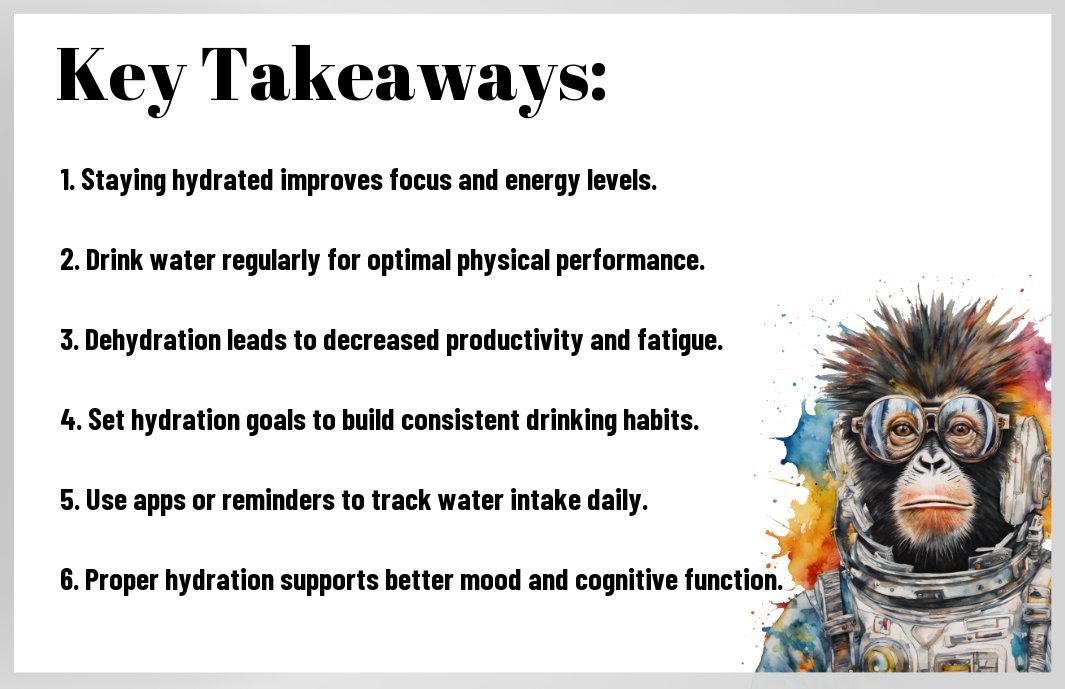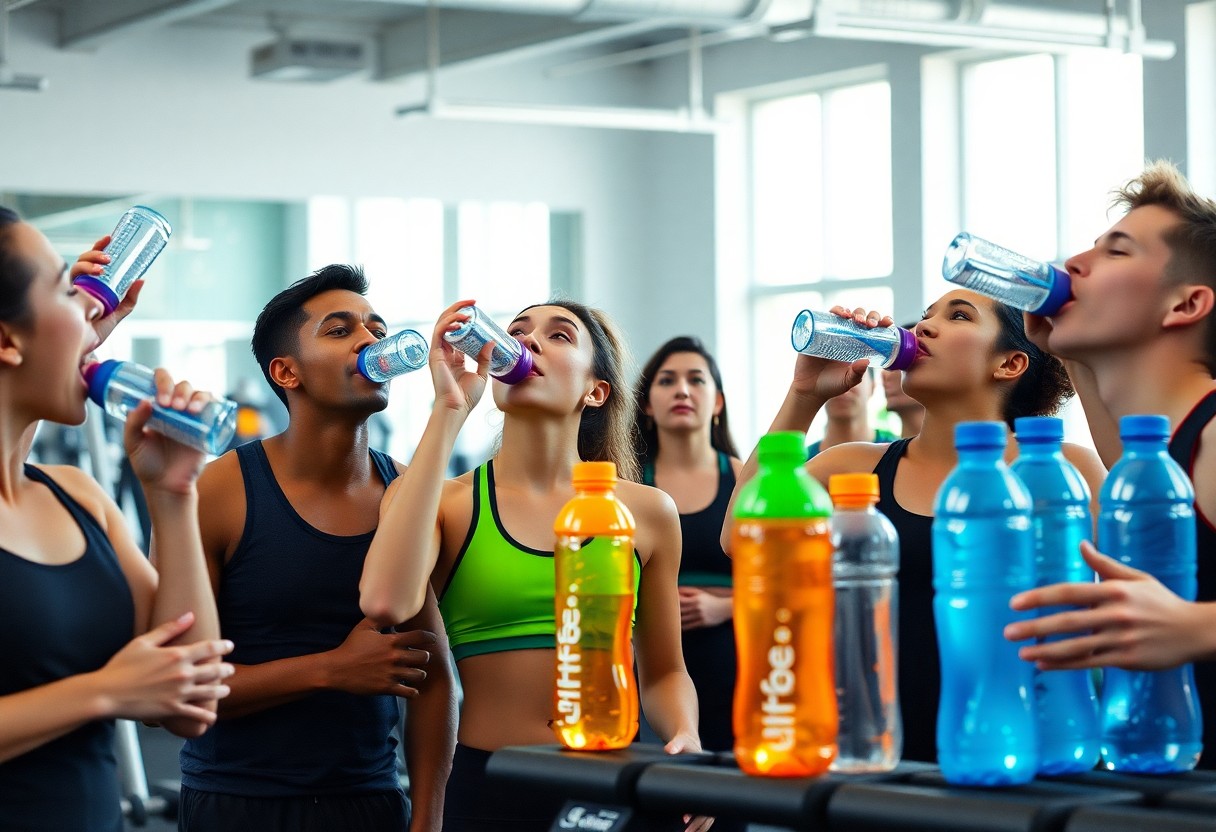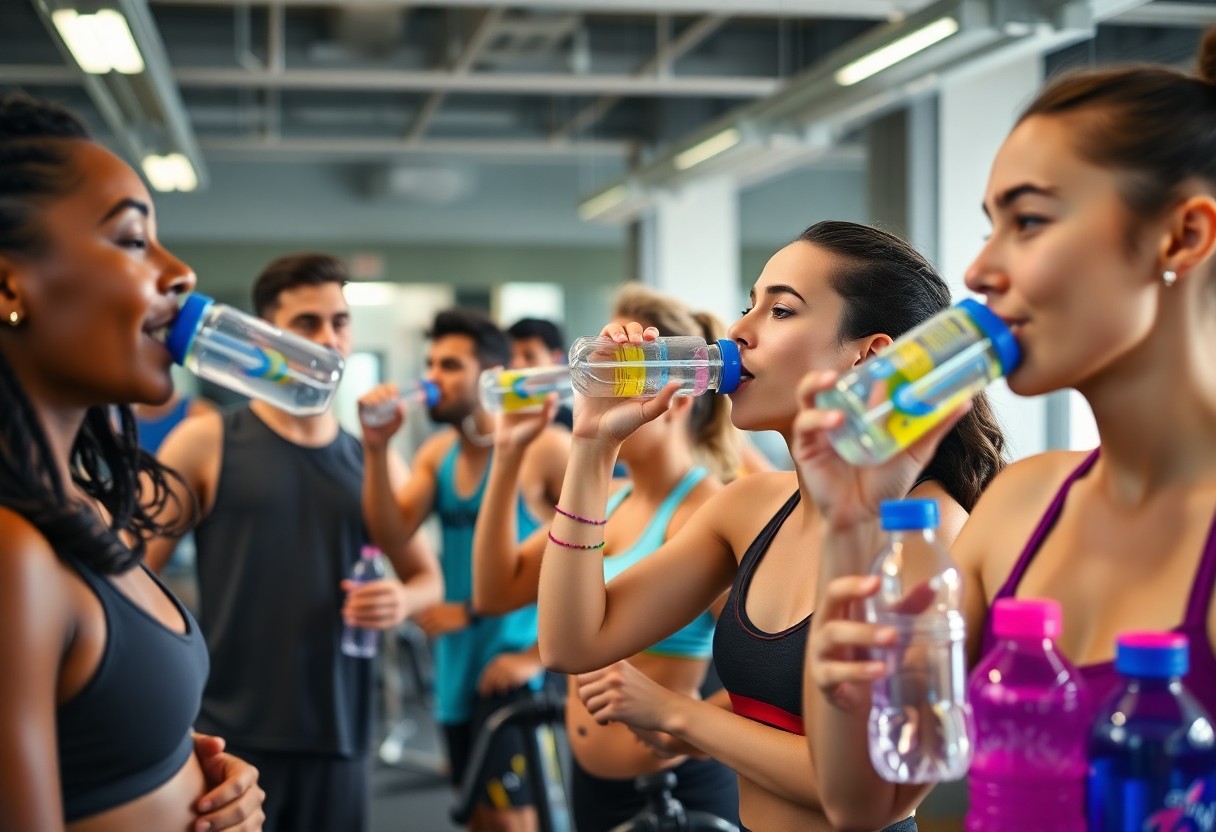It’s necessary for you to stay properly hydrated, as dehydration can significantly impair your cognitive and physical performance. By integrating adequate water intake into your daily routine, you can enhance your focus, energy levels, and overall well-being. Understanding the importance of hydration will empower you to make choices that directly affect your productivity and health. In this post, we’ll explore the benefits of water, how much you should be drinking, and tips to help you prioritize hydration consistently.
Key Takeaways:
- Staying adequately hydrated can significantly enhance physical performance and mental clarity throughout the day.
- Establishing a consistent water intake routine helps individuals develop healthy hydration habits.
- Incorporating hydration breaks into daily schedules fosters overall well-being and productivity in the workplace.
The Importance of Hydration
As an vital component of your overall health, hydration plays a significant role in maintaining your body’s functions. Water is vital for regulating temperature, transporting nutrients, and removing waste. Staying hydrated helps enhance your physical performance, mental clarity, and energy levels. When you prioritize hydration, you give your body the support it needs to thrive, ultimately leading to improved productivity and well-being.
Understanding Hydration’s Role in Performance
Above all, hydration is key to optimizing your physical and mental performance. Sufficient water intake helps maintain endurance, reduces fatigue, and improves reaction times during activities. Whether you’re exercising, working, or engaging in daily tasks, staying hydrated is vital for keeping your focus sharp and your body functioning at its best.
Signs of Dehydration
At times, you might not realize that you are becoming dehydrated until it starts affecting your performance. Common signs include dry mouth, fatigue, dizziness, and dark yellow urine. If you experience these symptoms, it’s imperative to take action to rehydrate. Ignoring these signs can lead to more serious health issues.
To effectively combat dehydration, you should be aware of its key signs. These can include persistent thirst, dry skin, headaches, and a noticeable decrease in your energy levels. Severe dehydration may even cause confusion or rapid heartbeat, which are warning signs that should not be ignored. Keep an eye on how your body feels, and prioritize drinking water regularly to ensure that you maintain optimal hydration for enhanced performance.

Health Benefits of Staying Hydrated
It is imperative to understand that staying properly hydrated offers a multitude of health benefits that can significantly enhance your overall well-being. Hydration plays a vital role in various bodily functions, including temperature regulation, joint lubrication, and nutrient absorption. By prioritizing your water intake, you can not only maintain optimal health but also improve your performance in daily activities and exercise.
Physical Performance Enhancements
About 75% of your muscle tissue is water, and maintaining optimal hydration levels can drastically improve your physical performance. You may experience increased endurance, improved strength, and enhanced recovery times when you drink enough water. Staying well-hydrated ensures that your muscles function effectively, allowing you to perform at your best during workouts and physical activities.
Cognitive Function and Clarity
Enhancements in cognitive function are also significantly linked to hydration. When you maintain adequate water intake, your brain operates more efficiently, leading to improved focus and better decision-making. Dehydration can lead to fatigue and diminished reaction times, adversely affecting your ability to perform tasks effectively.
For instance, studies have shown that even mild dehydration can lead to impaired concentration and poor memory. When you’re hydrated, you promote better blood flow and oxygen delivery to the brain, resulting in sharper cognitive abilities and enhanced mood. Adequate hydration ensures you stay alert, making it easier to tackle challenges and maintain productivity throughout your day.

Daily Hydration Recommendations
Despite the common belief that daily hydration is optional, it is vital for your overall well-being and performance. Staying hydrated not only enhances your physical health but also positively impacts your cognitive capabilities. For more insight, check out How Hydration Impacts Productivity in the Workplace. Make it a priority to meet your hydration needs each day for optimal performance.
How Much Water Do You Need?
Below are general guidelines for daily water intake, which may vary based on personal factors:
- Men: About 3.7 liters (or 125 ounces) per day.
- Women: About 2.7 liters (or 91 ounces) per day.
Factors That Affect Hydration Needs
Before determining how much water you need, consider the following factors that can influence your hydration requirements:
- Activity level: Increased physical exertion elevates your need for water.
- Climate: Hot and humid environments can lead to greater water loss.
- Diet: High-salt or high-protein foods may necessitate higher water intake.
Thou should evaluate these elements regularly to ensure your hydration aligns with your lifestyle.
Recommendations for staying hydrated go beyond merely drinking when thirsty. You should actively monitor your hydration status and adjust based on:
- Exercise intensity: More demanding workouts require increased water consumption.
- Health conditions: Certain medical issues can impact fluid needs.
- Age: Older adults often need to be more vigilant about hydration.
Thou must take these components seriously to maintain optimal hydration and wellbeing.
Best Practices for Staying Hydrated
All hydration efforts are vital for optimizing your daily performance and overall wellness. To maintain peak condition, it’s vital to incorporate effective practices into your routine that keep your body adequately supplied with water. Pay close attention to your body’s signals and adapt your fluid intake as needed to uphold your energy levels throughout the day.
Hydration Tips for Active Individuals
Around your active lifestyle, staying hydrated requires intentionality. Here are some hydration tips to keep you at your best:
- Carry a water bottle wherever you go
- Drink water before, during, and after exercise
- Add electrolytes to your water for intense workouts
- Consume hydrating foods like fruits and vegetables
Perceiving hydration as a key component in your fitness will help you enhance your overall performance.
Hydration Strategies Throughout the Day
Along your daily activities, implementing effective hydration strategies can make all the difference. Plan to drink a glass of water when you wake up, during meals, and between tasks to ensure a steady intake.
Staying consistent with your hydration can significantly affect your energy, focus, and general well-being. Create a schedule that includes set times for drinking water, such as before meals and every few hours. Consider using a smartphone app to track your intake, ensuring you meet your daily hydration goals. Not only does regular hydration combat fatigue, but it also supports your metabolism and keeps your skin healthy. Ignoring your body’s hydration needs can lead to dehydration, impacting your performance and overall health.
Hydration and Exercise
Unlike many believe, proper hydration is not just about drinking water during workouts. Staying adequately hydrated can enhance your performance, stamina, and recovery. When you exercise, your body loses fluids through sweat, and replenishing these fluids is necessary to maintain optimal bodily functions. Without sufficient hydration, you may experience fatigue, decreased coordination, and reduced endurance—ultimately impacting your overall performance.
Timing Your Water Intake
Above all, timing is necessary when it comes to hydration. Aim to drink water before, during, and after your workouts. By doing so, you ensure that your body is well-hydrated and ready to perform. Additionally, drinking water in the hours leading up to exercise can help maintain your hydration levels throughout your session.
Hydration for Endurance vs. Strength Training
Across various training types, hydration needs differ significantly. For endurance training, you may need to consume larger amounts of fluids to replace what you lose, while strength training requires less but still important hydration. Adequate hydration supports blood flow, nutrient delivery to muscles, and overall performance adaptations.
Plus, understanding your body’s needs can greatly enhance your training results. In endurance exercise, hydration prevents fatigue and improves stamina, whereas for strength training, proper hydration helps maintain muscle function and may reduce injuries. Know your activity’s demands—over-hydrating during strength sessions or under-hydrating during endurance can lead to unwanted effects. Staying attentive to your individual hydration requirements will empower you to optimize your performance effectively.
The Role of Hydration in Recovery
After intense physical activity, your body needs to replenish lost fluids for optimal recovery. Hydration plays a vital role in restoring electrolytes, reducing muscle fatigue, and improving overall performance. When you prioritize drinking water post-exercise, you aid your body in repairing tissues and maintaining healthy joint function, which can enhance your recovery process and prepare you for your next workout.
Post-Exercise Recovery Strategies
Recovery strategies include effective hydration practices that involve consuming water or electrolyte-rich beverages after your workouts. By strategically rehydrating, you can replace lost fluids and support your body’s natural healing processes. Pairing hydration with nutritious foods can further enhance recovery, allowing you to bounce back stronger and ready for future training sessions.
Long-Term Hydration Habits
Beside immediate recovery, establishing long-term hydration habits is crucial for maintaining your overall health and performance. Consistently drinking adequate water throughout the day ensures your body operates at its best, enhancing physical and mental capabilities.
Due to the natural processes your body undergoes daily, establishing good hydration habits is vital. You might experience negative side effects such as fatigue or decreased focus when your hydration levels are low. Furthermore, chronic dehydration can lead to serious health issues, including kidney stones and urinary tract infections. On the other hand, maintaining proper hydration can lead to enhanced physical performance, improved cognitive function, and faster recovery from workouts. Prioritize a balanced intake of water and monitor your hydration status, as it prominently influences your overall well-being.
Conclusion
With these considerations, you can harness the full benefits of hydration to boost your performance in everyday activities. By making water consumption a priority and integrating it into your daily routine, you’ll enhance your focus, energy levels, and overall well-being. Staying mindful of your hydration needs can lead to improved productivity and a healthier lifestyle. Embrace the power of water and experience the positive changes it can bring to your life.
FAQ
Q: What is WorkWell – Hydration Nation?
A: WorkWell – Hydration Nation is an innovative initiative aimed at emphasizing the importance of hydration for overall health and performance. By promoting regular water intake, the program seeks to enhance physical well-being, mental clarity, and productivity throughout daily activities.
Q: How does drinking water impact performance?
A: Staying properly hydrated is linked to improved cognitive function, enhanced physical endurance, and increased energy levels. Water plays an necessary role in maintaining body temperature, cushioning joints, and facilitating digestion. Therefore, adequate hydration can lead to heightened focus, quicker reaction times, and overall better performance in both work and physical activities.
Q: What are some practical tips for staying hydrated throughout the day?
A: There are several effective strategies to maintain hydration levels. Set regular reminders to drink water every hour, carry a reusable water bottle to track intake, and incorporate hydrating foods like fruits and vegetables into your meals. Also, consider establishing a routine, such as drinking a glass of water before each meal or after every meeting, to make hydration a consistent part of your day.

Leave a Reply